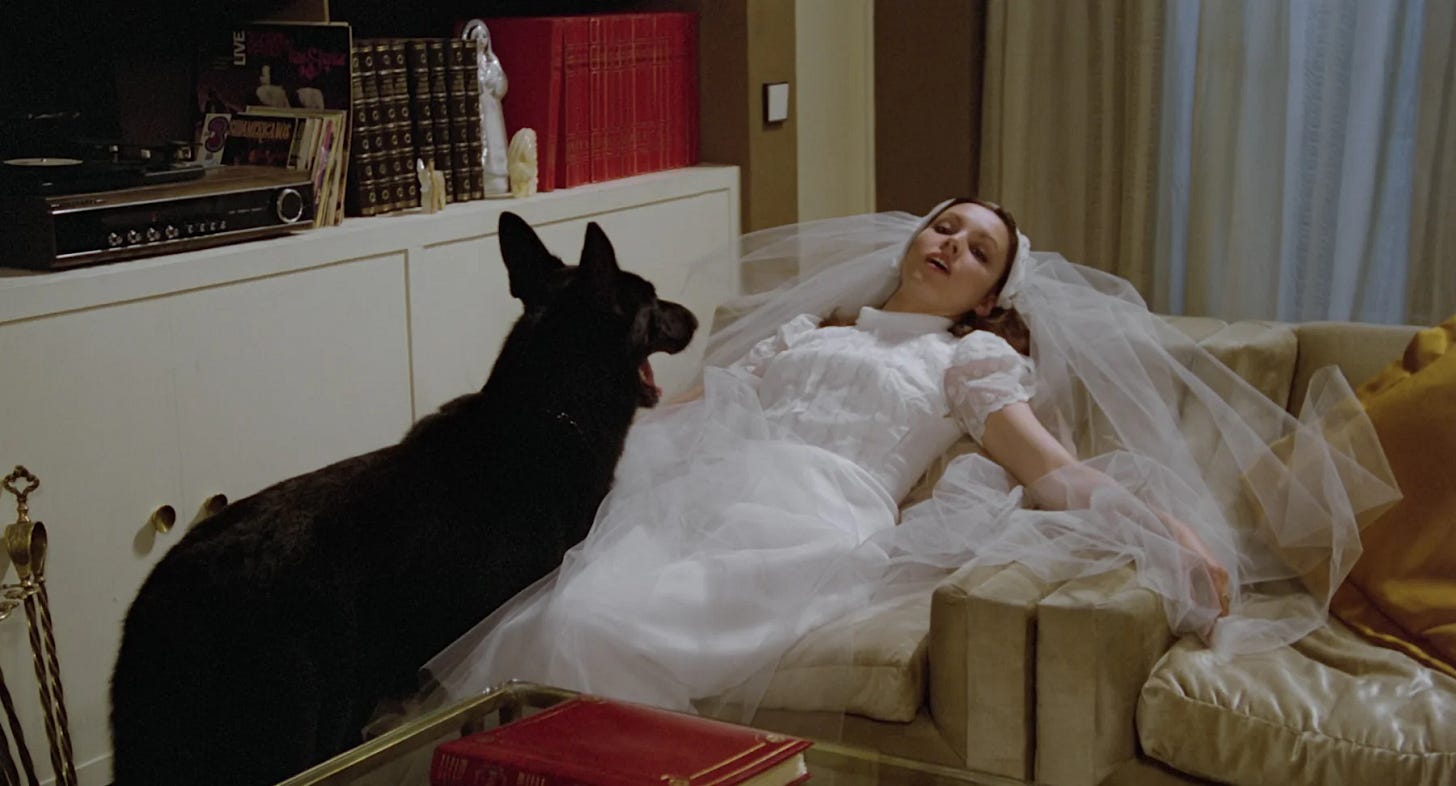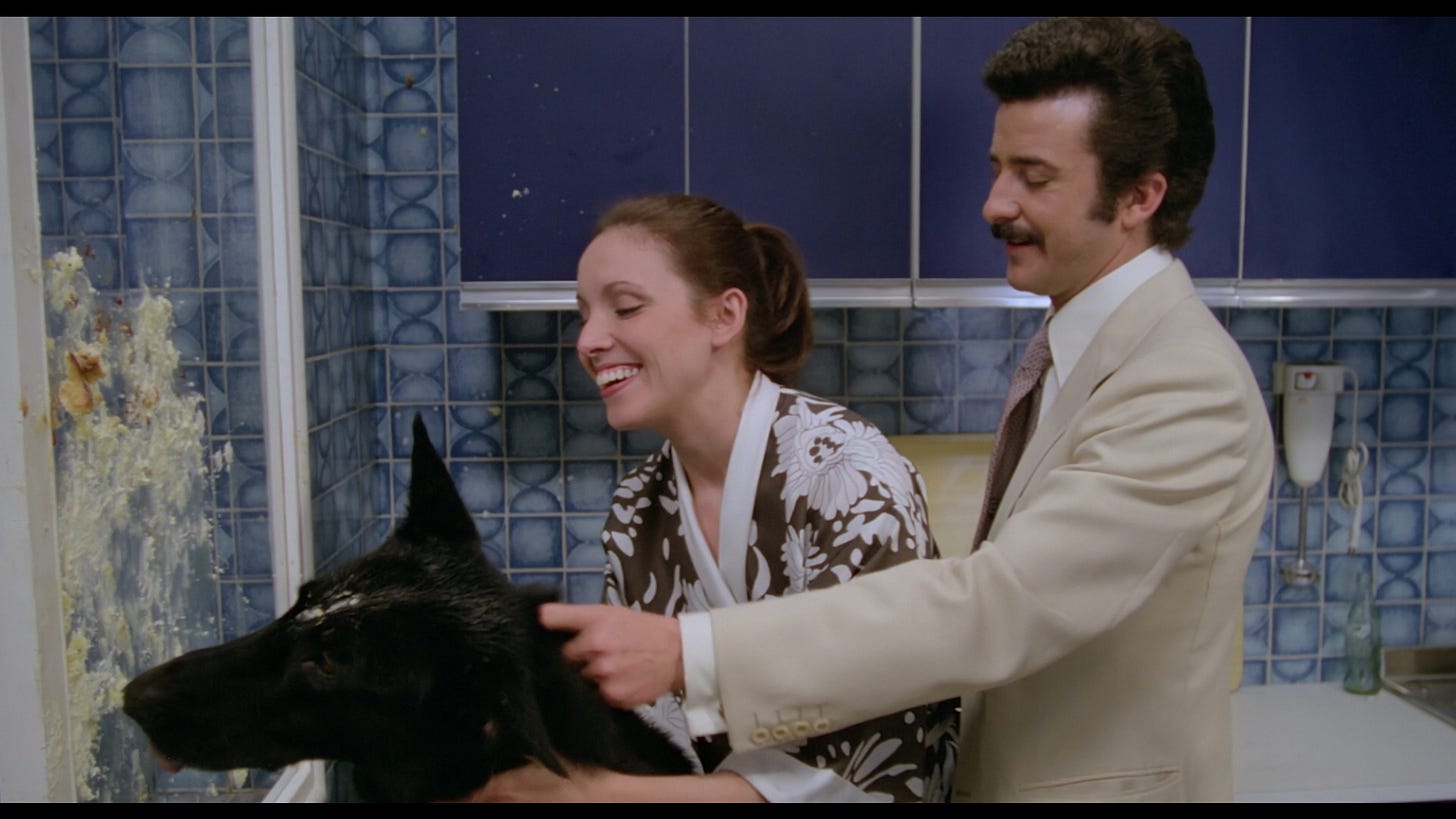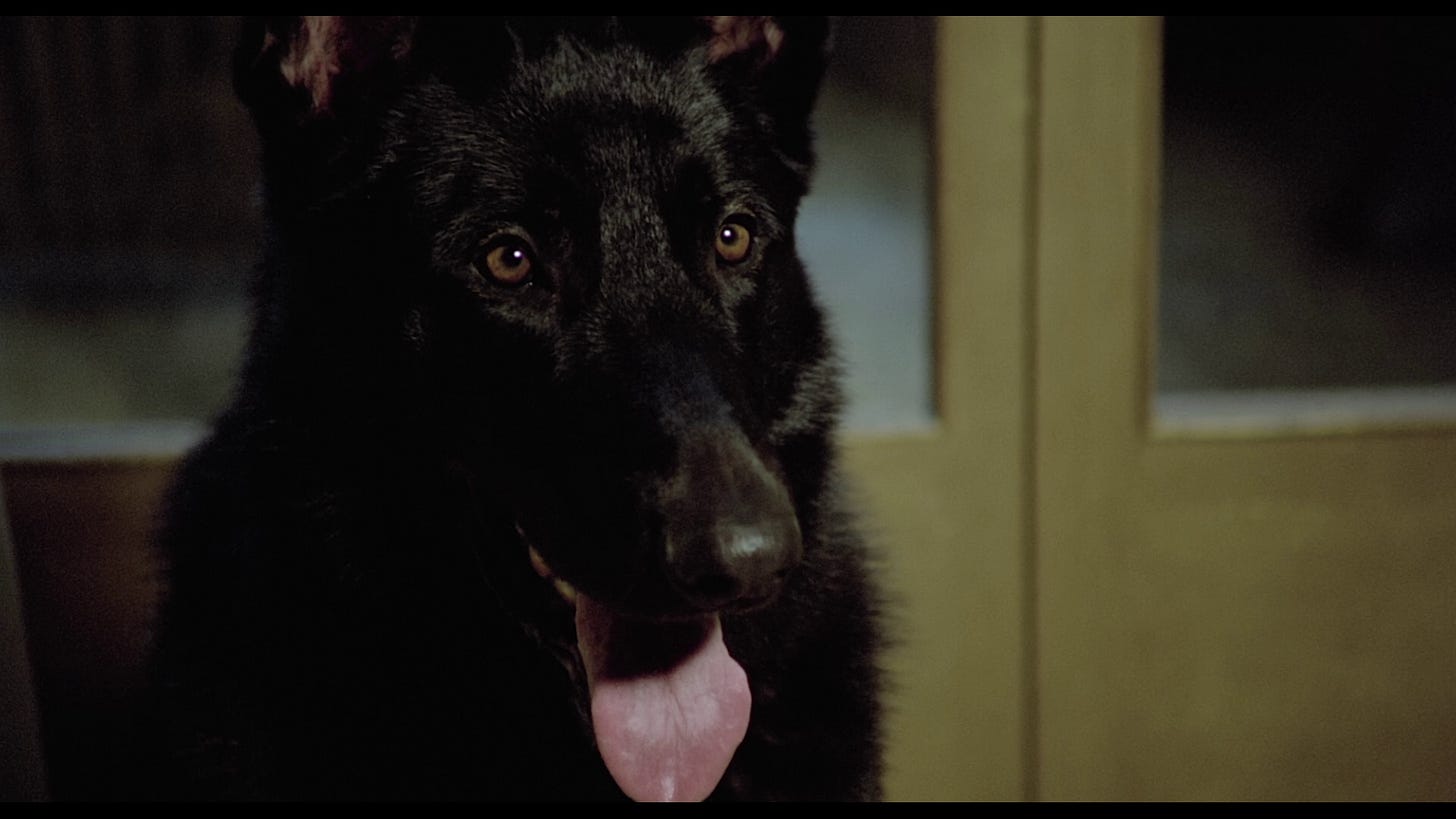DOG PERSON
The Creature is the anti-fascist love story between woman and dog you didn’t know you needed right now
It’s 1977 and Spain is still crawling out of the Franco era, even though more than a few elites would very much like it to go back. Marcos is an unctuous TV host and Cristina is his bored wife. While he’s being groomed by a far right party to run for office, a German shepherd comes into her life. It is love at first woof and the growing bond between the two soon destroys the veneer of her perfect marriage. Director Eloy de la Iglesia takes a straight-faced Douglas Sirk approach to the material, and it results in a kind of melodrama you have never seen before.
Please note that while The Creature pushes buttons, no one is going to get fired for having this article in their inbox. (Unless you work at the White House.) By taking the love story at the heart of this crude joke seriously, The Creature stays just on this side of suggestiveness and—dare we say—taste? By the end of the film we’re left knowing who the real weirdos are.
BRIAN J DAVIS: When I showed you the trailer, your response was just so wonderfully authentic.
EMILY SCHULTZ: What did I say?
BJD: After a long beat of silence you said, “I get it.” I think this movie really gets to something that is so personal for women, which is your relationship to animals.
ES: Because an animal can be your best friend. I mean, I’m definitely a dog person. I went out and I got my first dog when I was 20 and had that dog for 12 years through a dozen student apartments. But... the fact that this movie verges into something else does make me nervous.
BJD: Even though we might make jokes during this movie, it’s as serious as All That Heaven Allows. Except that it’s about the wife of a fascist falling in love with a dog.
ES: Fascist or dog? It’s not even a choice.
BJD: What this movie does with the subject of fascism is it just zeroes in on the fact it’s so based in gender. That a fascist turn for a society is sold as a kind of healing of a perceived wound against the masculinity of a country or a people. This film takes that to the logical conclusion: why wouldn’t she fall for a German shepherd!
ES: That’s an excellent point. I got swept up in this scene because the doctor just told her it’s okay if she smokes nine or ten cigarettes a day while pregnant.
BJD: I’ll use this as a jumping off point: It was a different time! Mid-70s Spain, when the old fascists would like to keep control. But they’re losing control.
ES: Not unlike today.
BJD: Here’s how we’ll be arrested. Let’s translate for today’s audience what’s happening in the movie. This would be like if Stephen Miller’s wife left him for a German shepherd.
ES: What happens if it turns out that statement is somehow foreshadowing?
BJD: In a Black Mirror way? I mean, look at him. If there was a support group for men this happened to, he’d fit in.
ES: It’s interesting that the husband is not a monster right away.
BJD: But the dog takes the mask off of him. And reveals how horrible he truly was all along.
ES: What do you think the pregnancy in this represents?
BJD: I think in the context of a country coming out of fascism, it’s the future. It’s both hope and unknowable.
ES: So this first dog terrifies her and then she miscarries. Then she finds a different dog. I guess it’s easy for the dog to be a stand-in for a man because you’re brought up with this idea that a man is there to protect you. The same way a dog is there to protect you, but sometimes a dog might attack you.
BJD: That goes to the idea that a fascist state wants to convince us: you need this, you need protection. And in the context of this movie: why not fall in love with a guard dog?
ES: I like that they let the dog relationship build slowly.
BJD: Well, that’s what you should with a good relationship, right?
ES: I guess what you have is the dog becomes almost like a stand-in for the baby. But then it becomes a stand-in for the husband as well.
BJD: Here’s the interesting thing about patriarchal men who really want a family, you know, the demand-y ones. I’ve noticed they’re also the first ones to get wounded when the child replaces them, attention-wise.
ES: Oh god them. In a way they’re replaced by what they want.
BJD: This is where it gets to be my favorite movie I’ve seen this year. Where the battle begins between Marcos and the dog. The privileges that the dog seems to have while privileges are being taken away from him. It’s so hilarious watching his life unravel.
ES: That dog is so lovable.
BJD: This movie has such strong emotions, it almost has the purity of a sitcom to it. The maudlin moments, the moments of laughter. But with this freakadoodle complication of falling in love with her dog. I want to point out that we were planning to do a series of movies about fascism but what we realized was there’s so many of them. From Spain, Chile, Germany, Italy, the Eastern Bloc. Movies are a great opponent to fascism. You think of fascism as a battle on the streets but the biggest battle is in our consciousness—the same place in our minds where films live.
ES: And in this movie the politics are pushed to the edge, until they’re not. It so zeroes in on the domestic space and it’s such a great place to have that discussion.
BJD: Again, it could be a sitcom from the ’70s. Although, I mean, I don’t want to mislead people. This is an emotionally serious film. With some extreme moments.
ES: It’s the human relationships that are extreme, including a partner sexual assault we do have to mention.
BJD: Whereas the dog-human relationship is played a little bit in a campy way. They push it just as far as they should. Oh, now they’re touring a new house. And he’s like, oh, maybe this could be the nursery. And she’s like, maybe this is the dog’s room. If I’m going to share something personal, it’s that I’m not a dog person, and being in a relationship with you over the years, and you are a dog person…I kind of was always aware of my place in the hierarchy!
ES: This scene. There always is this awkward moment where the dog has to be put out of the room.
BJD: Now she’s tsk-tsking the dog and the dog’s face is like, Yeah, call me a bad boy again. This is when the psychological torment of the story really ratchets up. Marcos brings home the big Christmas present and it’s ... a female dog!
ES: Oh, God, the hurt on her face. He’s trying to break them up.
BJD: When I first saw the new dog, I knew that dog is not long for this world. Something’s going to happen to it.
ES: She does the worst thing in the film. But again, she still comes off as the normal one.
BJD: He’s the one with the weird obsessions like, “What’s the race of the puppies going to be?” And now she’s alone with her dog again, showing her family photo albums to him. Would her husband have the patience for that?
ES: A dog listens, Brian.
BJD: They have such good chemistry.
ES: Is this leading up to the wedding dress?
BJD: Yes! She’s putting on the wedding dress and dancing with her dog. Have you ever danced with a dog?
ES: Everyone who has had a dog has danced with their dog! But the wedding dress part is not normal.
BJD: I have to tell you that I have clutched at invisible pearls twice while watching films in my life. One was during Ken Russell’s Crimes of Passion. The other…
ES: Was this?
BJD: When the husband walks in and she’s collapsed in the bed and on a chair next to the bed is the wedding dress covered in dirty paw prints!
ES: And in that moment he knows!
BJD: As a dog fan, how do you feel that this woman found her freedom through a dog?
ES: I think a lot of people find freedom through their pets, but particularly dogs. And particularly women. I would say my first dog kept me free and single. My second kept me in shape and brought me back into my life. The other thing about a dog is you’re always with the dog—
BJD: So things happen?
ES: No! I mean, there’s like a sense of independence. You can be self-reflective. If you have a dog, you don’t need a friend. You don’t need a housemate.
BJD: Oh look, is Super Dog going to bring her a towel….or not?
ES: He’s thinking more tug of war.
BJD: This is a scene where, through the magic of editing, they’re implying a lot more. Elsewhere the husband bombs out on his own affair. While wearing a Bismarck helmet, to put an underline under everything. So, is this technically a fable?
ES: I mean, it’s storytelling with an animal but the dog doesn’t talk.
BJD: But if he could! I think the radical thing is that her relationship with the dog feels good and her husband represents a perverse fascist world. He goes to a priest who implores him to get the dog out of the house immediately! Now he gives her dog away to another woman.
ES: Who’s the creature now?
BJD: Now he’s giving his first political speech. “Here are the barks of those who advocate for freedom.” Even his fascist friends are like, Marcos sure seems a little hung up on dog imagery for some reason. Then she has a disturbing dream sequence where her husband is now chanting “Franco.” She wakes up, finds out she’s pregnant and races to get her dog back and to dump her husband.
ES: She drives so fast children are running away from her car. I do love this ending. She’s now very pregnant at their chalet. In a beautiful white dress. Her dog beside her.
BJD: Wonderfully alone! And she releases a goddamn white dove!
ES: She’s playing with the dog and literally barking now. They speak each other’s language!
BJD: Isn’t that the key to having a relationship that works? That should be the ending but no! The director freeze-frames on her belly. It’s throwing questions at us!
ES: Who’s the father?
BJD: What’s the future?
The Creature is available from Severin Films and streaming at Eternal Family






